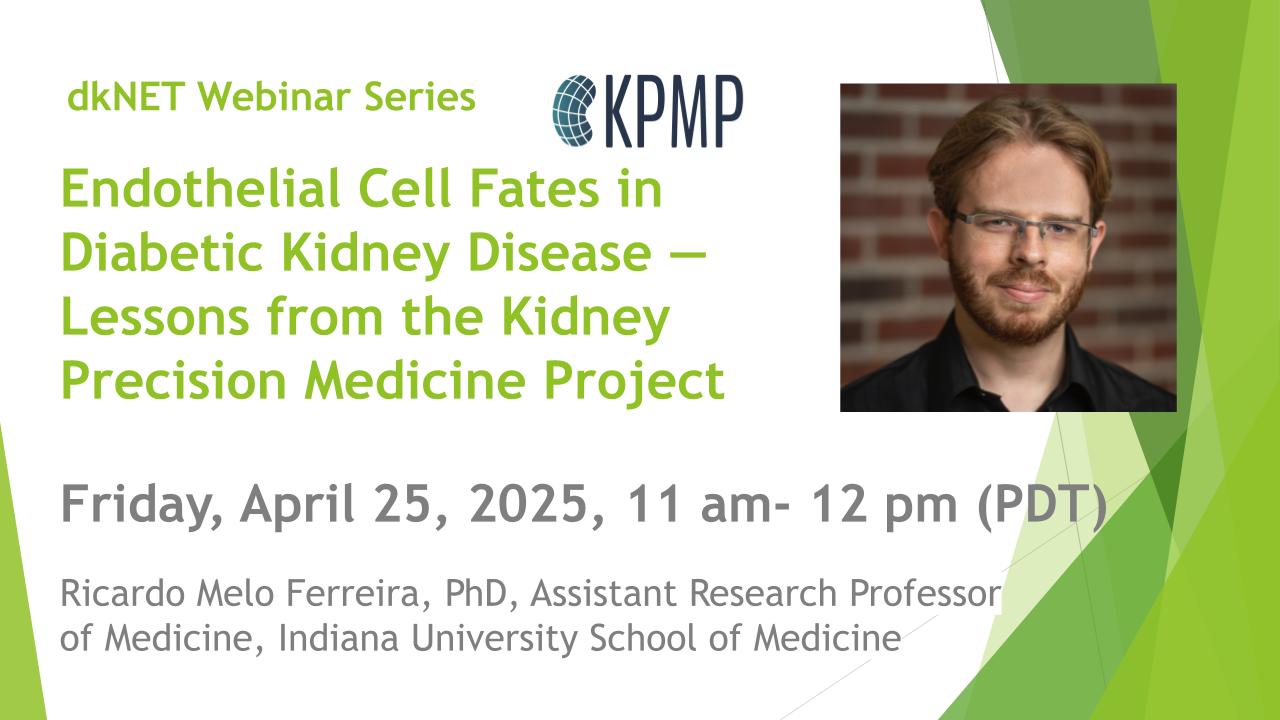Leaving Community
Are you sure you want to leave this community? Leaving the community will revoke any permissions you have been granted in this community.
dkNET community events and announcements in February, 2019
Dear dkNET Community,
dkNET provides updates on activities of interest to the NIDDK-supported community. You could keep up to date on these activities through our Twitter feed @dkNET_info, through our Community Calendar, or through dkNET e-mail list. If you have an event or funding opportunities you'd like to advertise, please contact us info_at_dknet.org.
Events in February, 2019
Feb. 1, 2019
Abstract deadline: 3rd Joint EASD Islet Study Group and Beta-Cell Workshop
Feb. 3-8, 2019
Gordon Research Conference: Understanding Human Diseases Through Metabolomics: Interactions Among the Genome, Proteome, Gut Microbiome and Nutrition
In this Gordon Conference series, we highlight state of the art metabolomics technologies and their applications to the study of human health and disease. We will cover most recent developments in the field covering applications of metabolomics for deeper understanding of disease mechanisms, disease heterogeneity and disease progression; variation in treatment outcomes and enablement of precision medicine approaches; connections between metabolome, proteome and genome and atlases being created; effects of exposome, diet and gut microbiome on human metabolome and health. We will highlight large consortia initiatives which enable epidemiology and clinical studies, functional genomics, nutrigenomics, pharmaceutical applications including toxicology studies, systems pharmacology, environmental exposures effects on health (exposome) and beyond. We invite established as well as early career members to attend this meeting from academia industry and regulatory agencies.Location: Ventura, CA, USA
More information: https://www.grc.org/metabolomics-and-human-health-conference/2019/
Feb. 10-14, 2019
Keystone Symposia: Functional Neurocircuitry of Feeding and Feeding Disorders (J8)
Location: Banff Springs, Banff, Alberta, Canada
More information: https://www.keystonesymposia.org/index.cfm?e=web.Meeting.Program&meetingid=1633
Feb. 10-14, 2019
Keystone Symposia: Obesity and Adipose Tissue Biology (J7)
Location: Banff, AB, Canada
More information: https://www.keystonesymposia.org/index.cfm?e=web.meeting.program&meetingid=1632
Feb. 13-15, 2019
Alberta British Columbia Islet Workshop 2019
Joint with the meeting on Cellular Plasticity: Reprogramming, Regeneration and Metaplasia (J3).
Location: Silver Star Mountain, British Columbia
More information: https://diabetesbc.ca/our-events/alberta-british-columbia-islet-workshop-2019
Feb. 20 -22, 2019
The ISSCR International Symposia: Stem Cells & Organoids in Development & Disease
Stem Cells & Organoids in Development & Disease offers three days of insightful presentations and conversations around a research topic at the forefront of our field. Renowned keynote speakers Hans Clevers and Jürgen Knoblich will give the opening and closing talks; in between, hear from invited experts from around the globe, and abstract-selectLocation: Amsterdam, Netherlands
More information: http://www.isscr.org/meetings-events/international-symposia/amsterdam-2019-symposium
Feb. 22-24, 2019
10th International Conference on Bioinformatics Models, Methods and Algorithms
The purpose of the International Conference on Bioinformatics Models, Methods and Algorithms is to bring together researchers and practitioners interested in the design and application of modelling frameworks, algorithmic concepts, computational methods, and information technologies to address challenging problems in Bioinformatics and Biomedical research.There is a tremendous need to explore how mathematical, statistical and computational techniques can be used to better understand biological processes and systems, while developing new methodologies and tools to analyze the massive currently-avail
Location: Prague, Czech Republic
More information: http://www.bioinformatics.biostec.org
Feb. 28, 2019
Submission deadline: The KidneyX - Redesign Dialysis Prize Challenge
The KidneyX: Redesign Dialysis prize challenge aims to accelerate the development and commercializati
More information: http://www.kidneyx.org
Funding opportunities information and deadlines in February, 2019
Feb. 21, 2019
NIDDK Funding Opportunity Letter of Intent Due Date: Development of New Technologies and Bioengineering Solutions for the Advancement of Cell Replacement Therapies for Type 1 Diabetes (R43/44 Clinical Trial Not Allowed)
This Funding Opportunity Announcement (FOA) invites Small Business Innovation Research (SBIR) grant applications for funding to perform research leading to the development of novel and supportive technologies for the improvement of cell replacement interventions using novel methods, biomaterials and devices for type 1 diabetes (T1D) treatment.
More information: https://grants.nih.gov/grants/guide/rfa-files/RFA-DK-18-023.html
Feb. 26, 2019
NIDDK Funding Opportunity Application Due Date: Human Islet Research Network - Consortium on Targeting and Regeneration (HIRN-CTAR) (U01 Clinical Trial Not Allowed)
This Funding Opportunity Announcement (FOA) solicits applications for the Consortium on Targeting and Regeneration (CTAR) that supports the development of innovative strategies to increase or protect functional human beta cell mass in patients with Type-1 Diabetes (T1D) through the controlled manipulation of beta cell replication, islet cell plasticity, and the reprogramming of pancreatic non-beta cells into beta-like cells, or through shielding the residual beta cell mass from the autoimmune environment. CTAR is part of the Human Islet Research Network (HIRN).
More information: https://grants.nih.gov/grants/guide/rfa-files/RFA-DK-18-014.html
Feb. 26, 2019
NIDDK Funding Opportunity Application Due Date: Human Pancreas Analysis Program (HPAP) (U01 Clinical Trial Not Allowed)
This Funding Opportunity Announcement (FOA) invites cooperative agreement applications to continue the mission of the existing Human Pancreas Analysis Program (HPAP). This FOA will support one team of investigators with combined expertise in human pancreas physiology and pathophysiology
More information: https://grants.nih.gov/grants/guide/rfa-files/RFA-DK-18-015.html
Feb. 26, 2019
NIDDK Funding Opportunity Application Due Date: Human Pancreas Analysis Program for Type-2 Diabetes (HPAP-T2D) (U01 Clinical Trial Not Allowed)
This Funding Opportunity Announcement (FOA) invites cooperative agreement applications to expand the operational scope of the existing Human Pancreas Analysis Program (HPAP) to the study of pancreata recovered from tissue donors with Type 2 Diabetes (T2D) and related metabolic disorders. This FOA will support one team of investigators with combined expertise in human pancreas physiology and pathophysiology
More information: https://grants.nih.gov/grants/guide/rfa-files/RFA-DK-18-016.html





